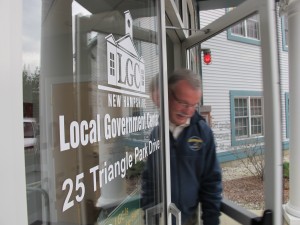Coalition Of Towns Challenges LGC Refund Plans

Amanda Loder / StateImpact New Hampshire
While the LGC remains the go-to place for municipal services, it's facing continued opposition over its handling of insurance surplus payments
It’s been a busy week on the Local Government Center beat.
Recently, we reported for NHPR that a coalition of 12 towns has banded together to demand what it calls its “fair share” of health insurance surplus payments from the Local Government Center. In the interests of bringing you up to speed, we’ll outline the gist of what happened with this ongoing saga.
This Week, On The LGC Beat…
The sticking point is that the LGC recently announced it plans to pay back more than $52 million to communities that paid into their health insurance and property-liability risk pools by offering a premium holiday. That’s basically the equivalent of store credit for buying more insurance.
But many of these coalition municipalities have withdrawn completely from the LGC. So they can’t benefit from the holiday.
On Monday, this group of disgruntled towns got a lawyer and sent a letter to the Bureau of Securities Regulation asking the state to investigate the LGC’s surplus return policy on the grounds that it was “discriminatory.”
The next day, Salem joined this group, making it a Gang of 13. (We documented that town’s disappointment with the LGC last week.)
The Letter: Highlights
In his letter to the Bureau of Securities Regulation, coalition attorney John Ratigan from the firm Donahue, Tucker & Ciandella laid out the crux of their complaint:
“The present position of the LGC that it is only obligated to return Surplus to those municipalities who are presently within the applicable trust program unlawfully discriminates against former municipal members whose contributions help create the surplus. The proposed distribution of surplus may also create a windfall to the LGC.
Such funds would have been returned to the Towns of Peterborough, Durham and the other Towns mentioned above, but for the LGC failing to perform annually its audit, actuarial and fiduciary responsibilities in accordance with law. We believe LGC’s refusal to return to Peterborough, Durham and the other Towns that join in this letter their prorata share of the Surplus is improper and contrary to law.”
Ringleaders: Peterborough And Durham
Durham and Peterborough are heading up the effort to get what they call their “fair share” of the surplus.
The Coalition
Auburn
Bennington
Canaan
Durham
Greenfield
Henniker
Lyndeborough
Northfield
Peterborough
Plainfield
Raymond
Temple
Salem (later addition)
“I don’t know if it’s a dollar, and I don’t know if it’s a hundred thousand dollars,” says Peterborough Town Administrator Pamela Brenner. “But regardless of if it’s a dollar or a hundred thousand dollars, it’s owed to the residents of Peterborough. And for that matter, with the health insurance, to the employees, who paid 20 percent of the premium.”
Peterborough left the LGC’s health insurance program, HealthTrust, in July of 2012. It’s also not part of the LGC’s Property-Liability Trust, the other program ordered to return millions of dollars to communities. “But due to the way they’re going about refunding it, which is a premium holiday, we receive no benefit to it,” Brenner says.
The situation is a little bit different for the town of Durham. It’s no longer part of the HealthTrust program. But unlike Peterborough and many of the others in the 13 town coalition, Durham hasn’t completely left the LGC’s program.
The town has five basic public employee units: firefighters, police, middle-managers, public works, and non-unionized. Durham moved two of those groups–police officers and non-unionized workers–to SchoolCare‘s competing health insurance program last July. Town Administrator Todd Selig says the remaining three units still have medical coverage through the Local Government Center. So under the LGC’s surplus return policy, he says the town would receive its refund on behalf of three-fifths of the public worker groups covered by the order.
“But even there, the only way to take advantage of that contribution holiday is to remain with LGC, which makes it problematic for Durham and other communities that are taking advantage of that premium holiday to really go out on the market and shop around and find another plan that perhaps offers equivalent programs but at a better price. Because they’d be leaving money on the table,” Selig says. “That’s problematic, and really creates a hook that makes it almost impossible for anyone who’s presently a member to leave.”
A Shift From The LGC?
In the past, the LGC has appeared to remain firm on the contribution holiday set-up for returning funds. Executive Director Maura Carroll says the reasoning behind that position is simple. “Several of our members have made comments that they do not want it returned in cash. They prefer either the rate credit or the contribution holiday,” Carroll explains. In the past, the LGC has expanded on that theme, saying that a number of communities find the accounting associated with the return of cash to be onerous.But that position has recently changed. “We’ve had a number of members who have requested that we return the surplus in cash. And the board voted to honor that, and so we will do that for anyone who makes that request in writing so that we have a record of it.”
But, Carroll says, that only applies to eligible communities. Referring to Hearing Officer Don Mitchell’s order, she explains. “What the order said, if we were returning the 2010 surplus based on the calculation that the hearing officer made, was if they were a member as of the date of the order, they were eligible to receive return of surplus,” Carroll says. “So if we used the language of the hearing officer, then those members who were members as of August 16, 2012, would be entitled.”
In the case of Durham, it appears it could get at least three-fifths of its money back with little fuss. But Peterborough is out of luck.
The State’s Response
As we’ve previously reported, the Bureau of Securities Regulation, has been vocally opposed to the LGC’s interpretation of Mitchell’s order. But since the New Hampshire Supreme Court has agreed to hear the LGC’s appeal, the bureau has been considering whether it’s worth taking further action against the LGC right now.
When the 12 (now 13) towns lodged their complaint with the BSR, the bureau’s outside counsel, Andru Volinsky told Annmarie Timmins of the Concord Monitor, “The bureau will need to look at this…There is nothing in the law that says you have to be a member to get your surplus back.”


